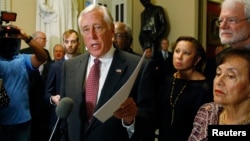U.S. President Donald Trump has blocked the release of a Democratic rebuttal to a Republican memo alleging FBI abuses of power during an investigation into Russian interference in the 2016 presidential election.
In a letter released Friday, White House counsel Don McGahn said Trump had decided not to declassify the Democratic memo “because the memorandum contains numerous properly classified and especially sensitive passages.”
The president himself expounded on that explanation Saturday on Twitter.
"The Democrats sent a very political and long response memo which they knew, because of sources and methods (and more), would have to be heavily redacted, whereupon they would blame the White House for lack of transparency. Told them to re-do and send back in proper form!"
Rep. Steny Hoyer, the No. 2-ranking Democrat in the House, released a statement late Friday saying, “It is deeply disturbing that President Trump has blocked the release” of the Democrat-written memo. He said that after Trump on Feb. 2 released “a one-sided, misleading memo written by Republicans on the House Intelligence Committee, it is only appropriate that Americans see all the facts.”
Revisions needed, McGahn says
McGahn’s letter to House Intelligence Committee Chairman Devin Nunes asked for revisions in the document before it could be released.
Nunes released a statement late Friday, saying, “I had warned that the Democratic memo contains many sources and methods ... it’s no surprise that these agencies recommended against publishing the memo without redactions.”
McGahn’s statement said because of the “public interest in transparency in these unprecedented circumstances, the president has directed that Justice Department personnel be available to give technical assistance to the committee” in its efforts to revise the document.
Trump had until the end of Friday to decide whether to declassify the memo, written by Democrats on the House Permanent Select Committee on Intelligence.
GOP memo
The president last week authorized the release of the Republican version of the memo, which claimed the FBI improperly obtained a warrant to spy on Carter Page, a former Trump campaign adviser, and his connections to Russia.
One of the issues is whether and to what extent the FBI relied on a dossier, compiled by former British spy Christopher Steele and funded in part by the Hillary Clinton campaign, as evidence to secure the surveillance warrant from a federal judge.
The Republican memo said the dossier formed an “essential part” of the warrant application, but doesn’t mention what other evidence, if any, was used. The Republican memo also suggested the FBI did not sufficiently disclose the political nature of the dossier and its author.
No obstacles
Before its release, the FBI said in a statement Jan. 31, “We have grave concerns about material omissions of fact that fundamentally impact the memo’s accuracy.”
The FBI declined to comment on the Democrats’ memo.
A U.S. official told VOA on Friday the intelligence community “saw no major obstacles” to releasing the Democrats’ memo.
One reason for the heightened concerns from the Justice Department about the Democrats’ memo may be that most of the intelligence came from the FBI, and not other parts of the intelligence community.
If that is the case, former FBI assistant director Ron Hosko believes it is wise to be cautious.
“It sounds as though the White House is relying, this time, on DOJ and FBI assessments that there are potential revelations of sources and methods that need more protection,” said Hosko, who now serves as president of the Law Enforcement Legal Defense Fund.
“It’s not surprising that may be the case as the Democrats have suggested they need to fill in some omissions by the Republicans to correct the record,” he said.
Democratic lawmakers contend the Republican-approved statement “cherry-picks” information and overstates the importance of the Steele dossier in the FBI warrant application.
Some White House officials have called for the original FISA application to be released to clear up the confusion.
Trump feels vindicated
Trump has said the Republican memo “totally vindicates” him of wrongdoing in the ongoing investigation into Russian meddling in the election and whether he obstructed justice in trying to limit the probe.
But the Republican document also noted that the investigation started months before the Page warrant request, when FBI agents began looking into another Trump adviser, George Papadopoulos.
National Security correspondent Jeff Seldin and Capitol Hill correspondent Katherine Gypson contributed to this report.






